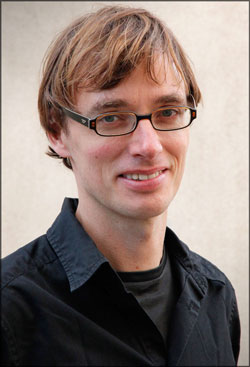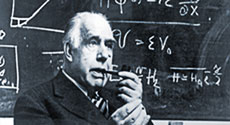Inaugural lecture by Peter Lodahl
Quantum optics studies the fundamental interaction between photons and matter and is usually considered a research discipline where extremely pure optical systems are investigated. For example, a paradigm in quantum optics is a single two-level atom considered to be alone in the universe and allowed to interact only with a single photon.

Professor Peter Lodahl, leader of the Quantum Photonics group at the Niels Bohr Institute.
Solid-state systems, on the other hand, are often considered dirty and messy and as a consequence rather remote from quantum optics experiments. Nonetheless modern nanofabrication methods of synthesizing solid-state semiconductors have enabled a new research frontier where quantum optics can be studied in solid-state systems. The benefit of solid-state quantum optics implementations is expected to be immense since it lays out a pathway towards scalable quantum information processing.
Here we will describe quantum optics experiments based on solid-state emitters (quantum dots) in nanophotonic structures. Solid-state systems enable the tailoring of the coupling between light and matter, whereby complex quantum architectures can be constructed. Quantum dots are of inherent many-particle nature; they consist of thousands of atoms and are intimately coupled to environmental decoherence. Despite these complexities, quantum dots are surprisingly often described with concepts developed for paradigmatic quantum optics. A closer investigation, however, reveals fundamentally new physics that is unique to solid-state systems. As a surprising conclusion, it turns out that imperfections and complexity can be used to the advantage of enhancing the coupling strength between photons and quantum dots thereby enabling quantum optics experiments.
Peter Lodahl received the M.Sc. degree in physics in 1997 from University of Aarhus and the Ph.D. degree from University of Copenhagen in 2000. He spent four years as postdoc at Caltech in Pasadena, USA and University of Twente, The Netherlands. In 2005 he joined the Technical University of Denmark as an associate professor to start a new research direction on solid-state quantum optics. In September 2011 he was appointed professor at the Niels Bohr Institute, University of Copenhagen and is leading the experimental Quantum Photonics Group consisting of ten researchers. He has received the Young Researcher's Award from the Danish Research Council in 2005 and a Starting Grant from the European Research Council in 2010.
|

 Niels Bohr Lectures
Niels Bohr Lectures